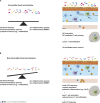Microbiome influencers of checkpoint blockade-associated toxicity
- PMID: 36622383
- PMCID: PMC9836236
- DOI: 10.1084/jem.20220948
Microbiome influencers of checkpoint blockade-associated toxicity
Abstract
Immunotherapy has greatly improved cancer outcomes, yet variability in response and off-target tissue damage can occur with these treatments, including immune checkpoint inhibitors (ICIs). Multiple lines of evidence indicate the host microbiome influences ICI response and risk of immune-related adverse events (irAEs). As the microbiome is modifiable, these advances indicate the potential to manipulate microbiome components to increase ICI success. We discuss microbiome features associated with ICI response, with focus on bacterial taxa and potential immune mechanisms involved in irAEs, and the overall goal of driving novel approaches to manipulate the microbiome to improve ICI efficacy while avoiding irAE risk.
© 2023 Wang et al.
Conflict of interest statement
Disclosures: Y. Wang reports consultant fees from AzurRx, MabQuest, Sorriso, and Sanarentero. R.R. Jenq reports advisory board membership for MaaT Pharma, LisCure, Seres, Kaleido, and Prolacta; consultant fees from Merck, Microbiome DX, and Karius; patent license fees from Seres; and stock options from Seres. J.A. Wargo is an inventor on a US patent application (PCT/US17/53.717) submitted by the University of Texas MD Anderson Cancer Center, which covers methods to enhance immune checkpoint blockade responses by modulating the microbiome; reports compensation for speaker’s bureau and honoraria from Imedex, Dava Oncology, Omniprex, Illumina, Gilead, PeerView, Physician Education Resource, MedImmune, Exelixis and Bristol Myers Squibb; has served as a consultant/advisory board member for Roche/Genentech, Novartis, AstraZeneca, GlaxoSmithKline, Bristol Myers Squibb, Micronoma, OSE Therapeutics, Merck, and Everimmune; and receives stock options from Micronoma and OSE Therapeutics. S.S. Watowich has served as a consultant/advisory board member for Asylia Therapeutics and Cellino Biotech and reports laboratory research support from SniprBiome.
Figures


References
-
- Abu-Sbeih, H., Herrera L.N., Tang T., Altan M., Chaftari A.P., Okhuysen P.C., Jenq R.R., and Wang Y.. 2019. Impact of antibiotic therapy on the development and response to treatment of immune checkpoint inhibitor-mediated diarrhea and colitis. J. Immunother. Cancer. 7:242. 10.1186/s40425-019-0714-x - DOI - PMC - PubMed
-
- Andrews, M.C., Duong C.P.M., Gopalakrishnan V., Iebba V., Chen W.S., Derosa L., Khan M.A.W., Cogdill A.P., White M.G., Wong M.C., et al. 2021. Gut microbiota signatures are associated with toxicity to combined CTLA-4 and PD-1 blockade. Nat. Med. 27:1432–1441. 10.1038/s41591-021-01406-6 - DOI - PMC - PubMed
Publication types
MeSH terms
Substances
Grants and funding
LinkOut - more resources
Full Text Sources
Medical
Research Materials

